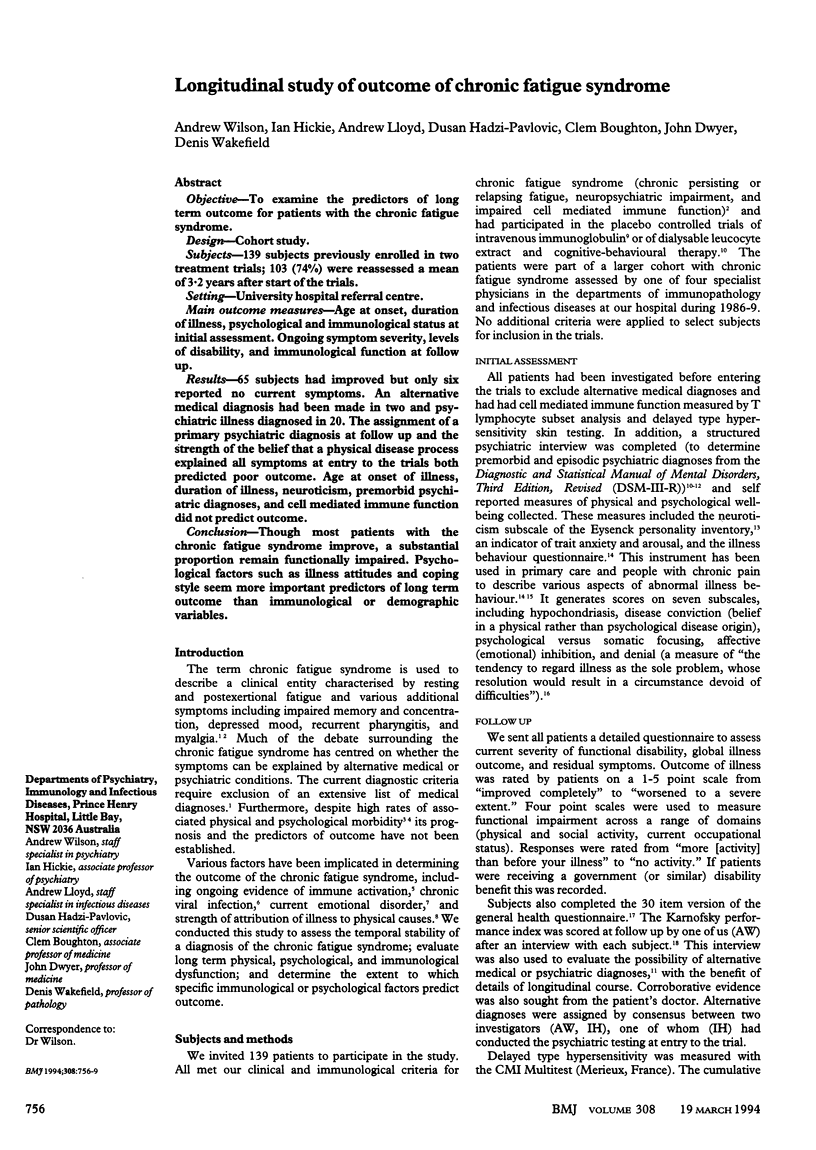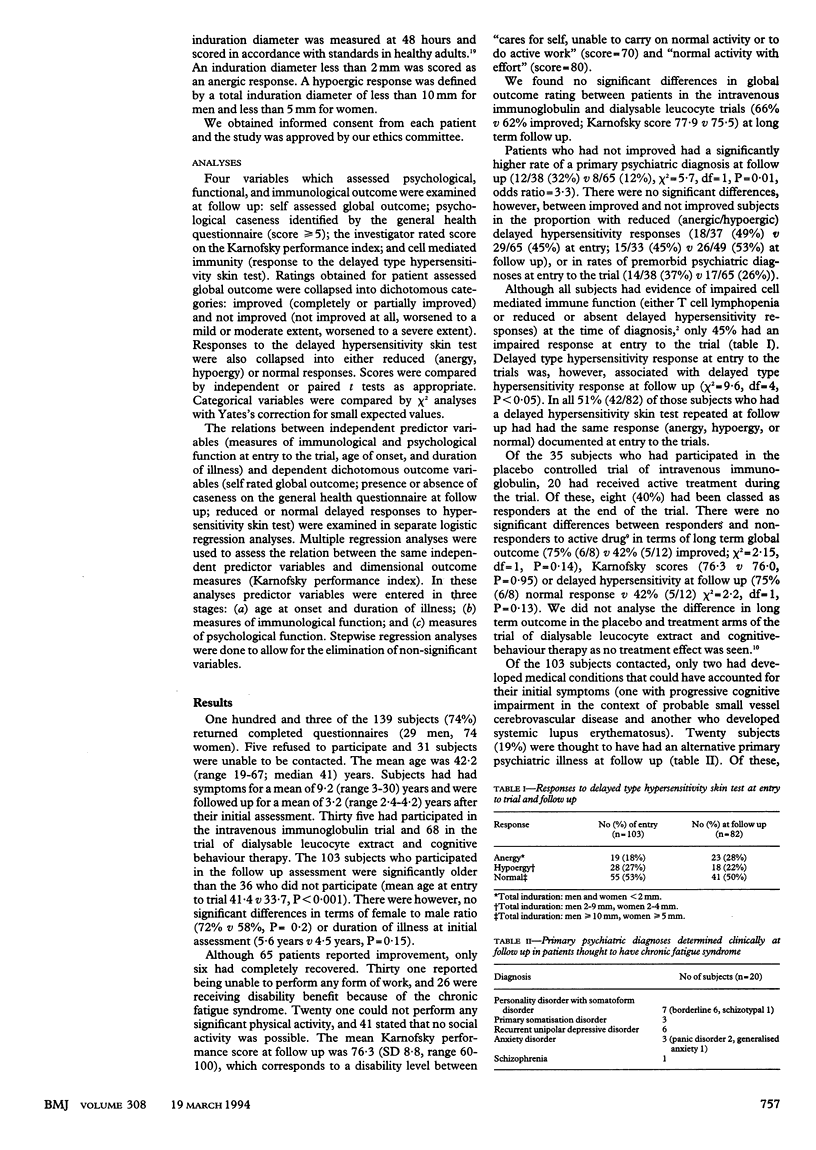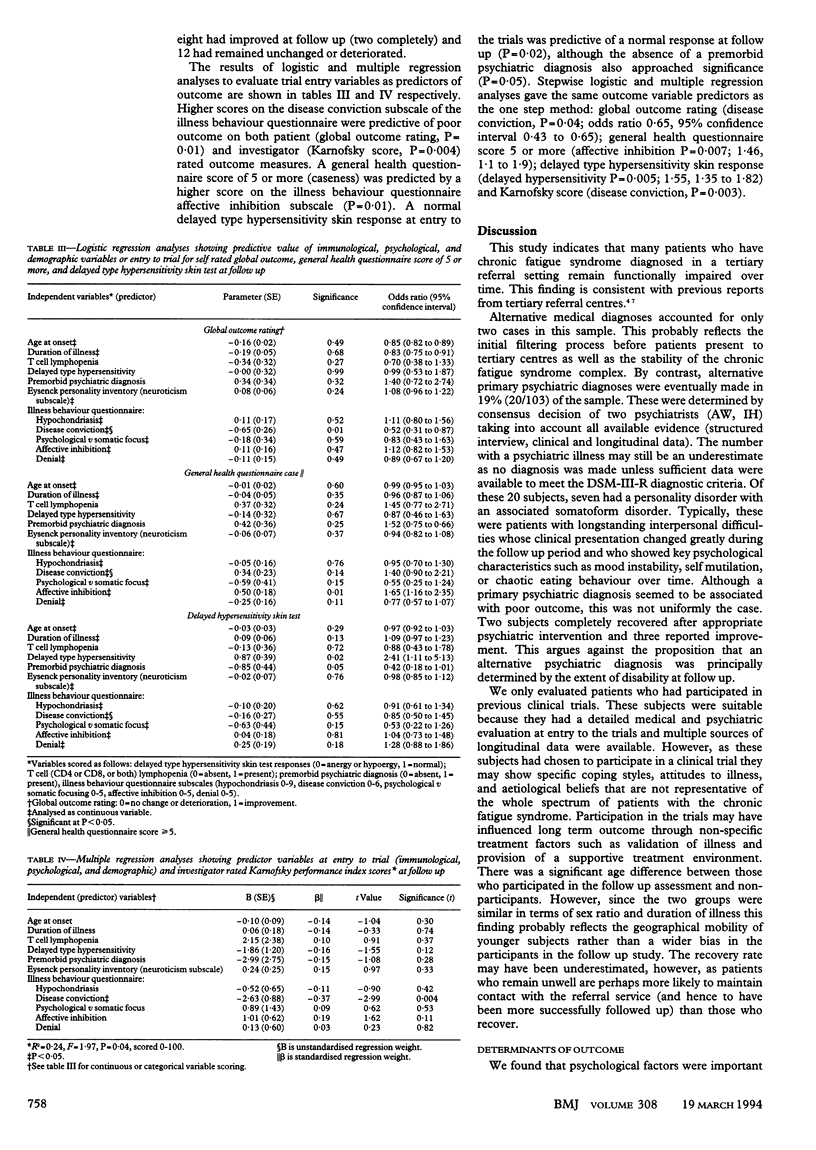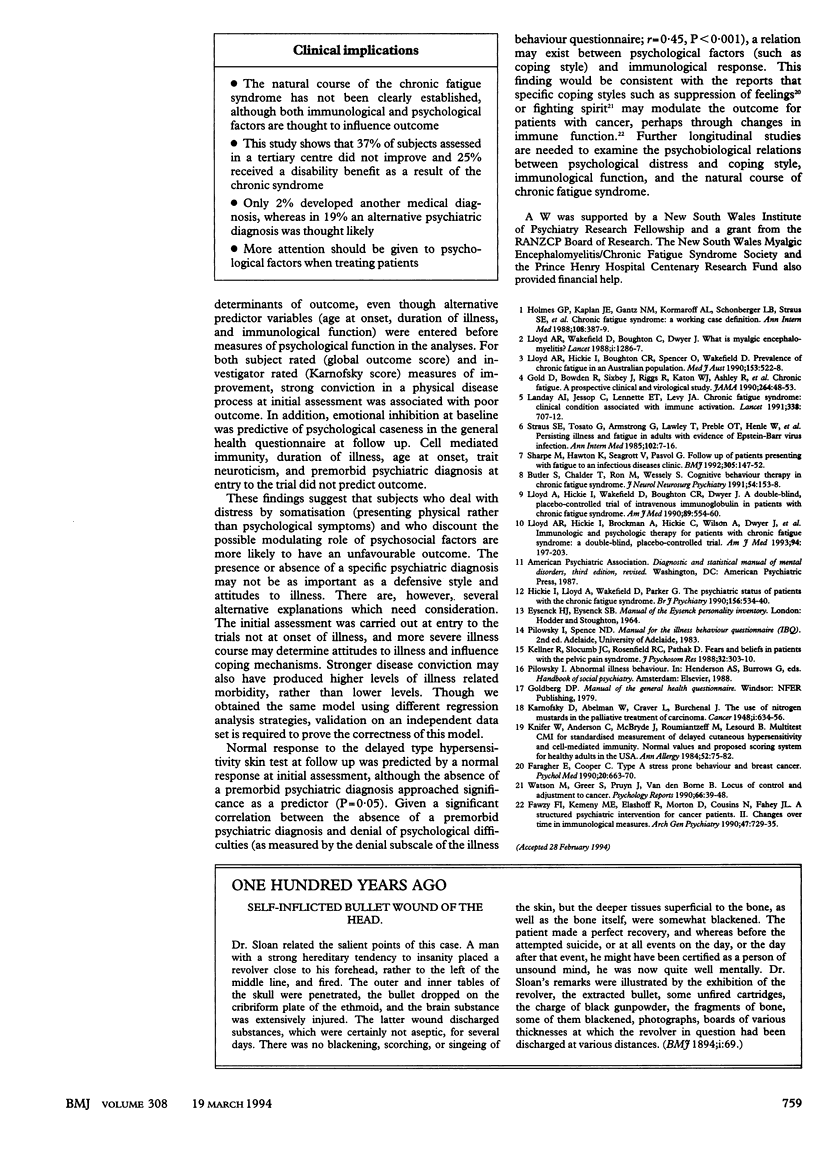Abstract
OBJECTIVE--To examine the predictors of long term outcome for patients with the chronic fatigue syndrome. DESIGN--Cohort study. SUBJECTS--139 subjects previously enrolled in two treatment trials; 103 (74%) were reassessed a mean of 3.2 years after start of the trials. SETTING--University hospital referral centre. MAIN OUTCOME MEASURES--Age at onset, duration of illness, psychological and immunological status at initial assessment. Ongoing symptom severity, levels of disability, and immunological function at follow up. RESULTS--65 subjects had improved but only six reported no current symptoms. An alternative medical diagnosis had been made in two and psychiatric illness diagnosed in 20. The assignment of a primary psychiatric diagnosis at follow up and the strength of the belief that a physical disease process explained all symptoms at entry to the trials both predicted poor outcome. Age at onset of illness, duration of illness, neuroticism, premorbid psychiatric diagnoses, and cell mediated immune function did not predict outcome. CONCLUSION--Though most patients with the chronic fatigue syndrome improve, a substantial proportion remain functionally impaired. Psychological factors such as illness attitudes and coping style seem more important predictors of long term outcome than immunological or demographic variables.
Full text
PDF



Selected References
These references are in PubMed. This may not be the complete list of references from this article.
- Butler S., Chalder T., Ron M., Wessely S. Cognitive behaviour therapy in chronic fatigue syndrome. J Neurol Neurosurg Psychiatry. 1991 Feb;54(2):153–158. doi: 10.1136/jnnp.54.2.153. [DOI] [PMC free article] [PubMed] [Google Scholar]
- Faragher E. B., Cooper C. L. Type A stress prone behaviour and breast cancer. Psychol Med. 1990 Aug;20(3):663–670. doi: 10.1017/s0033291700017189. [DOI] [PubMed] [Google Scholar]
- Fawzy F. I., Kemeny M. E., Fawzy N. W., Elashoff R., Morton D., Cousins N., Fahey J. L. A structured psychiatric intervention for cancer patients. II. Changes over time in immunological measures. Arch Gen Psychiatry. 1990 Aug;47(8):729–735. doi: 10.1001/archpsyc.1990.01810200037005. [DOI] [PubMed] [Google Scholar]
- Gold D., Bowden R., Sixbey J., Riggs R., Katon W. J., Ashley R., Obrigewitch R. M., Corey L. Chronic fatigue. A prospective clinical and virologic study. JAMA. 1990 Jul 4;264(1):48–53. doi: 10.1001/jama.264.1.48. [DOI] [PubMed] [Google Scholar]
- Hickie I., Lloyd A., Wakefield D., Parker G. The psychiatric status of patients with the chronic fatigue syndrome. Br J Psychiatry. 1990 Apr;156:534–540. doi: 10.1192/bjp.156.4.534. [DOI] [PubMed] [Google Scholar]
- Holmes G. P., Kaplan J. E., Gantz N. M., Komaroff A. L., Schonberger L. B., Straus S. E., Jones J. F., Dubois R. E., Cunningham-Rundles C., Pahwa S. Chronic fatigue syndrome: a working case definition. Ann Intern Med. 1988 Mar;108(3):387–389. doi: 10.7326/0003-4819-108-3-387. [DOI] [PubMed] [Google Scholar]
- Kellner R., Slocumb J. C., Rosenfeld R. C., Pathak D. Fears and beliefs in patients with the pelvic pain syndrome. J Psychosom Res. 1988;32(3):303–310. doi: 10.1016/0022-3999(88)90072-4. [DOI] [PubMed] [Google Scholar]
- Kniker W. T., Anderson C. T., McBryde J. L., Roumiantzeff M., Lesourd B. Multitest CMI for standardized measurement of delayed cutaneous hypersensitivity and cell-mediated immunity. Normal values and proposed scoring system for healthy adults in the U.S.A. Ann Allergy. 1984 Feb;52(2):75–82. [PubMed] [Google Scholar]
- Landay A. L., Jessop C., Lennette E. T., Levy J. A. Chronic fatigue syndrome: clinical condition associated with immune activation. Lancet. 1991 Sep 21;338(8769):707–712. doi: 10.1016/0140-6736(91)91440-6. [DOI] [PubMed] [Google Scholar]
- Lloyd A. R., Hickie I., Boughton C. R., Spencer O., Wakefield D. Prevalence of chronic fatigue syndrome in an Australian population. Med J Aust. 1990 Nov 5;153(9):522–528. doi: 10.5694/j.1326-5377.1990.tb126191.x. [DOI] [PubMed] [Google Scholar]
- Lloyd A. R., Hickie I., Brockman A., Hickie C., Wilson A., Dwyer J., Wakefield D. Immunologic and psychologic therapy for patients with chronic fatigue syndrome: a double-blind, placebo-controlled trial. Am J Med. 1993 Feb;94(2):197–203. doi: 10.1016/0002-9343(93)90183-p. [DOI] [PubMed] [Google Scholar]
- Lloyd A. R., Wakefield D., Boughton C., Dwyer J. What is myalgic encephalomyelitis? Lancet. 1988 Jun 4;1(8597):1286–1287. doi: 10.1016/s0140-6736(88)92107-1. [DOI] [PubMed] [Google Scholar]
- Sharpe M., Hawton K., Seagroatt V., Pasvol G. Follow up of patients presenting with fatigue to an infectious diseases clinic. BMJ. 1992 Jul 18;305(6846):147–152. doi: 10.1136/bmj.305.6846.147. [DOI] [PMC free article] [PubMed] [Google Scholar]
- Straus S. E., Tosato G., Armstrong G., Lawley T., Preble O. T., Henle W., Davey R., Pearson G., Epstein J., Brus I. Persisting illness and fatigue in adults with evidence of Epstein-Barr virus infection. Ann Intern Med. 1985 Jan;102(1):7–16. doi: 10.7326/0003-4819-102-1-7. [DOI] [PubMed] [Google Scholar]
- Watson M., Pruyn J., Greer S., van den Borne B. Locus of control and adjustment to cancer. Psychol Rep. 1990 Feb;66(1):39–48. doi: 10.2466/pr0.1990.66.1.39. [DOI] [PubMed] [Google Scholar]


